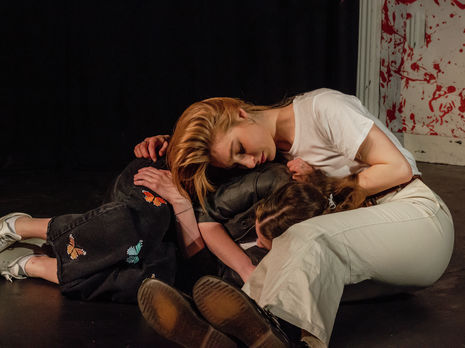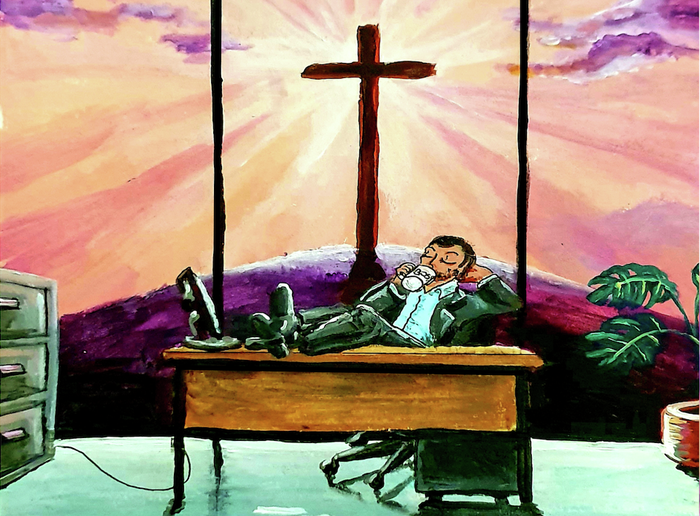Between comedy and tragedy: previewing Unsoiled
Theatre Editor Georgina Hayward interviews the writer and co-director of ‘Unsoiled’, Ewan Martin Kane

Before writing the first draft of the script that would become Unsoiled, student writer Ewan Martin-Kane had an idea for a joke that could only work on stage.
A character enters with a shovel, determined to dig their own grave. As they attempt to plunge it into the ground, they find that they are unable to dig beneath the stage floor. The sound the shovel makes as it hits the hard ‘ground’ makes the audience laugh.
It’s a dark concept. It’s also quite funny. When writing Unsoiled, Ewan was interested in the space between the tragic and the comic; exactly how far can a writer push a moment of absurdity on stage before it suddenly becomes very serious?
The play follows a small farming community who find that the ground they have ploughed for generations has hardened beneath them. It’s an idea that has the potential to break the audience’s immersion: as much as the characters try, the stage floor at the Corpus Playroom isn’t going to budge. This is something that Ewan embraces. “There’s a lovely moment in tragicomedy when we realise that, while we’ve all been laughing, death has crept in,” he says.
“How far can a writer push a moment of absurdity on stage?”
As the play goes on, the threat of starvation looms, and tensions in the village of Briggsley begin to rise. Ewan hopes that the production will provoke a mixed, multi-layered response. “It’s funny until it’s not,” he says. “Because they need to eat.”
The play is set in a distant, vaguely mediaeval past, "not fettered by any time period". Ewan feels that plays that try to replicate the look of one era tend to come across camp and artificial. By allowing the story a loose sense of time and place, the play could achieve a feeling of immediacy. The story of a community destabilised by an unfathomable natural disaster certainly has its parallels in the real world. Though he didn’t set out to write an allegory, Ewan admits that the climate crisis and coronavirus do provide an inevitable context.
“The rhythm and pace of the characters’ speech is essential”
The play’s hazy sense of setting has also given him an opportunity to play around with the dialogue, and experiment with what he describes as "the thorny, twisty tropes of language." Characters in Briggsley village have their own unique dialect. When writing, he repurposed old phrases and idioms to construct speech that felt unfamiliar, but not entirely alien. The cast have contributed to the process. “The play will only be finished once it’s performed,” he tells me. The script was ready before rehearsals began, but he could only get to grips with the flow of the dialect when the cast gave life to the language.
Ewan is co-directing the production, along with Anna-Maria Woodrow. Bringing his script to the stage has been a satisfying experience, though he admits to being a stickler when it comes to the cast’s delivery of their lines. For him, the life of the play is in the dialogue. It’s meant to be “poetic, not prosaic”, so the rhythm and pace of the characters’ speech is essential. ’I must wind the cast up,” he laughs. “Saying, ’you’ve got to stress that preposition. You’ve said ‘on’ wrong!’’
When I ask what he hopes to elicit from his audience, Ewan’s first response is that wants them to have a good, enjoyable time. His second is that he’d like the play to make people care a little more, about themselves and each other. It’s a high hope that matches the script’s ambitious approach to language. If Unsoiled lives up to its concept, it promises to be a memorable, boundary-pushing production.
Unsoiled will play from Tuesday 1st March - Saturday 5th March at 7pm at the Corpus Playroom.
 News / Cambridge academics stand out in King’s 2026 Honours List2 January 2026
News / Cambridge academics stand out in King’s 2026 Honours List2 January 2026 Comment / Plastic pubs: the problem with Cambridge alehouses 5 January 2026
Comment / Plastic pubs: the problem with Cambridge alehouses 5 January 2026 News / Cambridge businesses concerned infrastructure delays will hurt growth5 January 2026
News / Cambridge businesses concerned infrastructure delays will hurt growth5 January 2026 News / AstraZeneca sues for £32 million over faulty construction at Cambridge Campus31 December 2025
News / AstraZeneca sues for £32 million over faulty construction at Cambridge Campus31 December 2025 Interviews / You don’t need to peak at Cambridge, says Robin Harding31 December 2025
Interviews / You don’t need to peak at Cambridge, says Robin Harding31 December 2025









